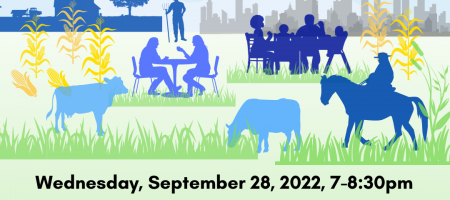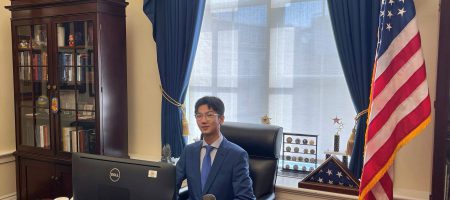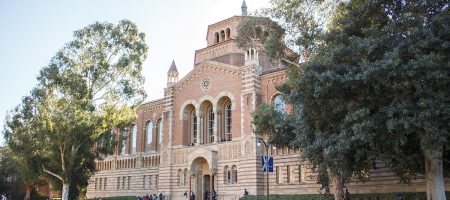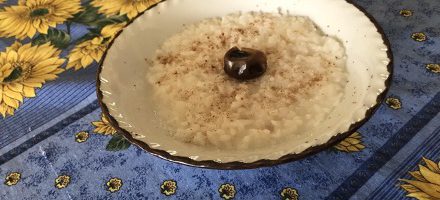People, Food, & Climate: Thinking holistically about what we eat
Beyond carbon emissions, how can soil science, regenerative agriculture, the built environment, and the policies that connect food cultures and communities, work holistically to make climate-conscious, transformative practices accessible in our own communities and ecosystems?
Join us for a discussion at the intersection of science, agriculture, policy, architecture, and the restaurant industry with:
- Aaron Blaisdell, PhD, Professor of Psychology, UCLA (Moderator)
- Paula Daniels, JD, Co-Founder and CEO, Center for Good Food Purchasing
- Jorge Gaviria, Co-founder of Masienda and author of MASA
- Paige L. Stanley, PhD, Postdoctoral Researcher at Cotrufo Soil Innovation Lab, Department of Soil and Crop Sciences at Colorado State University
- Christian Stayner, M.Arch, Founder and Managing Principal, Stayner Architects & co-founder of Bacetti
This in-person event is FREE and open to the public with limited capacity. Please register on Eventbrite by 11:59pm, Monday, September 26.
If you have any questions, please email info@scienceandfood.org.
Venue accessibility and directions:
- Please visit CNSI’s website for, current COVID-19 guidance, accessibility, and other details for this venue.
- You can also view UCLA’s campus accessibility map here.
- If you need accessibility accommodations, please email info@scienceandfood.org or let us know through your eventbrite registration.
- Transportation and parking directions to CNSI auditorium can be found here.
Science&Food at UCLA is organizing this event as part of the 2022 LA Times FoodBowl in partnership with EatWell Pod and Semel Healthy Campus Initiative (HCI) Center, with support from UCLA Rothman Family Institute for Food Studies, UCLA Food Studies Minor, Resnick Center for Food Law and Policy at UCLA Law, Innovation at the Nexus of Food, Energy and Water Systems (INFEWS), National Science Foundation, and California Nanosystems Institute, and UCLA Integrative Biology and Physiology (IBP).
About the featured speakers:
Dr. Aaron Blaisdell (Moderator) is a UCLA Professor of Psychology and Neuroscience, and a member of the Brain Research Institute, the Integrative Center for Learning & Memory, and the Evolutionary Medicine program. He received a BA in Anthropology (SUNY Stony Brook), an MS in Anthropology (Kent State University), a Ph.D. in Behavioral Neuroscience (SUNY Binghamton), and had 2 years of postdoctoral training (Tufts University). Dr. Blaisdell studies behavioral neuroscience and ancestral health. He co-founded the Ancestral Health Society and is Editor-in-Chief of the Journal of Evolution and Health.
Paula Daniels is Co-founder, Chief of What’s Next, and Founding Chair of the Center for Good Food Purchasing. She is a lawyer, and has held a number of senior executive positions in government on water policy in California and Los Angeles. She served as Senior Advisor on Food Policy to Mayor Villaraigosa of Los Angeles and taught food and water policy at UCLA for several years. She is an Ashoka Fellow, and a Stanton Fellow of the Durfee Foundation.
Jorge Gaviria is the founder of Masienda, a supplier of high-quality masa and masa products, and the company at the center of the heirloom masa movement in the US. Jorge trained at top restaurants, including Maialino and Blue Hill at Stone Barns, before founding his company in 2014. He has been recognized by top international press outlets for his work and was awarded Forbes 30 Under 30 for food and wine in 2017. He lives in Los Angeles. His passion is palpable in Masa, where he shares his research and expertise, including the knowledge he’s gained successfully working through tens of thousands of questions from home cooks – inquiries that cover everything from the best equipment to how to prevent a tortilla from falling apart during reheating.
Paige Stanley, PhD, is an interdisciplinary scientist working to understand how grazing management can sequester carbon (C) in soils to help mitigate climate change and build more resilient rangeland ecosystems. With a B.S. in Biology and Economics (Georgia College), M.S. in Animal Science (Michigan State University), and PhD in Environmental Science (University of California, Berkeley), she draws on a wide range of disciplines including soil biogeochemistry, grazing and rangeland ecology, agroecology, rancher sociology, and political ecology to approach research questions holistically. She is particularly interested in the use of “regenerative grazing” (or adaptive multi-paddock grazing) by ranchers on rangelands, and prioritizes on-ranch soil science work rather than highly controlled grazing experiments to ensure that her research captures soil C changes on real-life ranches, including from adaptive grazing management on large scales and long timeframes. Core to Paige’s work is centering ranchers throughout the research process, ensuring that research contributes to solving their on-the-ground challenges. To greatly improve real-world applicability, she incorporates social science methods to understand rancher mental models, including drivers and barriers of adoption for regenerative grazing, and works with a goal of creating science-informed policy for working rangelands.
Christian Stayner is a founding partner of Stayner Architects, a Los Angeles-based design practice that provides comprehensive architectural services across a broad range of scales and programs. He received his Masters in Architecture from the Harvard Graduate School of Design and his B.A. in Architecture and Human Rights Theory from Harvard College and the experimental liberal arts institution, Deep Springs College. Operating from its studio in Echo Park, Stayner Architects is a LGBTQ-led practice engaging exclusively with projects by non-profit public-benefit organizations such as schools, arts and culture organizations, and social service providers. They collaborate with entities who share a commitment to non-extractive business models. Beyond their architectural portfolio, Stayner Architects expresses ecological impact through self-directed missions like Tools & Utensils, an online resource for educational, cultural, and philanthropic institutions looking to advance the future of food on their campuses.





